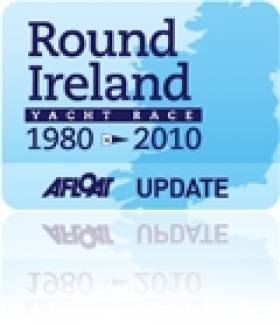Displaying items by tag: Mark Pollock
Before the race got on the water, the scene was set onshore with a storyboard lifted from Galway '09. In a bid to mirror the Volvo Ocean Race stop-over, the Round Ireland was smartly enmeshed with a successful town festival in Wicklow, drawing in thousands of non-sailing civilians, many of whom hung out on the cliffs to watch one of the best-attended starts in years.
The backbone for this year's story was Tonnerre de Breskens III, owned by Dutchman Piet Vroon. The crew arrived in Wicklow with a brace of RORC victories, leading RORC's offshore table, and went into the race as favourites. The first twist in Tonnerre's plot came before the starter's gun, when Vroon ended up in hospital, from where he would follow the race as his crew sailed on without him. However, that would be the only bump in their road. Tonnerre led from start to finish, both on the water and on handicap. Vroon's crew brought home the trophy for their ailing skipper in the race's happy ending.
There was drama in their wake, though. Not the high-octane 60-knot knock-down drama of 2008, but good stuff nonetheless. Bernard Guoy's Inis Mor chased hard to no avail, and in the end they just couldn't do it. Theirs was the story of the weary, the plucky but the ultimately unlucky. In 2008 gear failure put them out of the running, but in 2010 it was Tonnerre's sheer perfection that relegated Inis Mor to the runner-up spot. You would be hard pressed to find an error in their race, and they deserved the second slot.There were other big guns, of course. Mick Liddy and Mark Pollock's Daft.com Class 40 was a drama mini-series all of its own, with a blind co-skipper in a high-powered double-hander seeming a deluded concept to many. Until the batteries died they were churning out their own stories, uploading video content to beat the band. Of course, directorial priorities shifted when their electrics went as they headed up the west coast. Pollock's input was limited to nearly nil without electronics, meaning Liddy became all but a solo sailor without relief, helming non-stop for four days. Their initially promising position was eroded in the last third of the race as fatigue bit hard.
No similar excuses for the biggest boat in the race, the Open 60 Spirit of Rosslare Europort, which by all accounts should have made hay in some heavier airs off the west coast and come home first for line honours. However, they couldn't capitalise on that. Some will say that Tonnerre was better suited to the conditions than the larger Open 60, while others will dismiss that as folly.
The dogfights, then, the meat-and-veg of the story, were in IRC 1. Visit Malta Puma, another hot contender from the Solent, was in charge for much of the race while things were quietly making their way up the west coast. In the Round Ireland, as in Irish history, things have a way of kicking off around the north-east corner. As the tides and light airs played with the fleet, the lead changed hands six times between Inistrahull and the finish, with Fujitsu and Visit Malta Puma match-racing down the Irish Sea, and Bejaysus and Aquelina doing the same behind them.
Visit Malta Puma would emerge victorious, and in the meantime, the leaders of Class 2 and the double-handers were passing the mouth of Strangford Lough and crossing Dundrum Bay. Psipina and Dinah would trade tacks all the way to Wicklow, with Paddy Cronin in Psipina (joined by John Loden) making it two in a row in the two-handers overall. Second place, however, would go to one of the backmarkers.
Theirs was the rags-to-riches tale of this Round Ireland. Brians Flahive and Byrne took a boat all but written off and kitted it out for the 704-mile offshore. Noonan Boat Oystercatcher was the racing equivalent of a transplant patient, with a large portion of its port side removed and rebuilt by its owner, boatbuilder Graham Noonan, also Flahive's boss. Ten days before the race, the pair were rigging the tiny Gibsea with a spinnaker for the first time, and as the front of the fleet slowed, they rocketed on into second, not bad for a major offshore debut.
And while champagne corks were popping on land, there were still cups of tea being handed up to the rail from many galleys along the Irish Sea coast. The finish to the Round Ireland was prolonged, but deciding the results was not as strung out an affair as years gone by, the winner having been decided well in advance of the last finishers' arrival.
The question mark at the end of this story leaves things open for an innovative sequel. Dropped into the narrative mid-race were questions in the national media over how more racers might be tempted to Wicklow for 2012. The festival was, no doubt, a good start, but what of the date? Would moving it away from the annual date of the 1700-boat Solent carnival that is the Round the Island, putting further distance between it and Cork Week make sense? Would it make for a greater foreign entry? Eight of the 36 entries this year were from outside of Ireland - who's to say that couldn't be doubled or tripled?
That's a script yet to be written. For Round Ireland 2010, the credits are rolling. Wicklow SC can be proud that they delivered yet another successful edition of Ireland's classic offshore, and the various actors can take a deserved bow for playing their part in another home-produced oceanic drama.
Round Ireland Yacht Race 2010 Trophy Winners
Line Honours - Denis Doyle Trophy
Tonnerre de Breskens 3 - Piet Vroon
IRC Overall - Norman Barry Trophy
Tonnerre de Breskens 3 - Piet Vroon
Inis Mor - Bernard Gouy
Visit Malta Puma - Philippe Falle
Class 7 / Two Handed - The Noonan Trophy
Psipsina - John Loden & Paddy Cronin
Noonan Boats Oystercatcher - Brian Flahive
& Bryan Byrne
Alchimiste - Michael Murphy & Alex Voye
Class Super 0
Spirit of Rosslare Europort - Alan McGettigan
Class 0 - Mew Island Trophy
Tonnerre de Breskens 3 - Piet Vroon
Inis Mor - Bernard Gouy
Pride of Wicklow - James Gair/David O'Gorman
Class 1 - Tuskar Cup
Visit Malta Puma - Philippe Falle
Fujitsu - Andrew Britton
Aquelina - James Tyrrell
Class 2 - Fastnet Cup
Raging Bull - Matt Davis
Psipsina - John Loden & Paddy Cronin
Dinah - Barry Hurley & Hannah White
Class 3 - Skelligs Cup
Noonan Boats Oystercatcher -
Brian Flahive & Bryan Byrne
Alchimiste - Michael Murphy & Alex Voye
Cavatina - Ian Hickey/Eric Lisson
Class 4 - Tory Island Trophy
Noonan Boats Oystercatcher -
Brian Flahive & Bryan Byrne
Cavatina - Ian Hickey/Eric Lisson
Gumdrop - Derek Gilmore
Class 5 / Classic - Michael Jones Trophy
Cavatina - Ian Hickey/Eric Lisson
Class 6 / Sigma 38 - Larry Ryan Trophy
Persistance - Jerry Collins
ISORA Trophy
Raging Bull - Matt Davis
Irish Cruiser Racing Association -
Round Ireland Trophy
Aquelina - James Tyrrell
Team Kinsale Yacht Club Trophy
Team 'RORC': Tonnerre de Breskens 3 - Piet Vroon / Visit Malta Puma - Philippe Falle / Psipsina - John Loden & Paddy Cronin Team 'Go Hard or Go Home': Pride of Wicklow - James Gair/David O'Gorman / Aquelina - James Tyrrell / Noonan Boats Oystercatcher - Brian Flahive & Bryan Byrne
More on the Round Ireland Yacht Race:
Round Ireland Yacht Race 2010 Review
Round Ireland Yacht Race, Ireland's top offshore fixture
A Round up of 80 stories on the 2010 Round Ireland Yacht RaceBlind Yachtsman in Intensive Care After Fall
Blind adventurer and Round Ireland competitor Mark Pollock is in a stable but serious condition in the Royal Berkshire Hospital this evening after a fall from an upper floor window.
The Belfast-born explorer fell 25 feet from a bedroom window in a house where he was staying in Henley on Friday night.
Pollock, 34, is in intensive care, having sustained multiple broken bones and internal injuries in the fall.
Pollock won silver and bronze medals in rowing at the Commonwealth Games in 2002, and was attending the Henley Royal Regatta as a spectator. He had returned home early from Leander Club at 10.30pm and went to bed.
Some time after that, Pollock was sleepwalking and fell 25 feet into the front garden, where friends immediately came to his aid.
Pollock's fiancée Simone George credits his friends' quick reactions with saving his life.
"We want to say thank you to his friends for saving his life. We cannot express what we feel for them. Mark is focusing on getting better. He would like to thank everyone for their love and their prayers and their thoughts."
Pollock was still recovering from having completed the Round Ireland Yacht Race, becoming the first blind man to co-skipper a boat in the race.
He sailed the race in a Class 40 with Air Corps Captain Mick Liddy, finishing first on the water in the double-handed division, but further down the rankings on handicap.
The pair suffered severe electrical failure in the race when their alternator gave out. That disabled their autohelm which meant they were unable to sleep for nearly four days in a row.
Pollock's previous adventures have taken him to the South Pole, the Himalayas, the Dead Sea and elsewhere.






























































